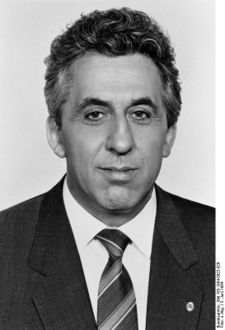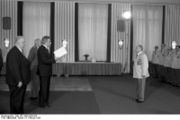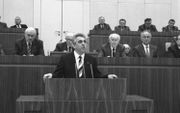Egon Krenz
| Egon Krenz | |
 |
|
|
General Secretary of the Central Committee of the Socialist Unity Party of Germany
|
|
|---|---|
| In office 18 October 1989 – 3 December 1989 |
|
| Preceded by | Erich Honecker |
| Succeeded by | Office abolished |
|
Chairman of the Council of State of the German Democratic Republic
|
|
| In office 18 October 1989 – 3 December 1989 |
|
| Preceded by | Erich Honecker |
| Succeeded by | Manfred Gerlach |
|
|
|
| Born | 19 March 1937 Kolberg, Germany |
| Political party | Socialist Unity Party of Germany |
| Profession | Politician |
Egon Krenz (born 19 March 1937) is a former politician from East Germany (the German Democratic Republic), and that country's last Communist leader. He succeeded Erich Honecker as leader of the ruling Socialist Unity Party of Germany (SED) and head of state in October 1989, but was ousted just under three months later amid the collapse of the communist regime.
Throughout his career, Krenz held a number of prominent positions in the communist regime. He was Honecker's deputy from 1984 onward, and thus the second most influential politician in the GDR from 1984 until he succeeded Honecker in 1989 amid protests against the regime. Krenz was unsuccessful in his attempt to retain the communist regime's grip on power, and was forced to resign some weeks after the fall of the Berlin Wall.
After the German reunification in 1990 he was sentenced to six and a half years in prison for manslaughter, for his role in the crimes of the regime.
Contents |
Early years
Krenz was born in Kolberg in what was then Germany, now Poland. His family were resettled in Damgarten in 1944, when Germans were expelled from Farther Pomerania.
Political career in the GDR
Krenz joined the Socialist Unity Party of Germany (SED) in 1955. Throughout his career, Krenz held a number of posts in the SED and the communist government. He was leader of the Ernst Thälmann Pioneer Organisation from 1971 to 1974, and became a member of the central committee of the communist party in 1973. He was also a member of the People's Chamber (the GDR's legislature) from 1971 to 1990, and a member of its presidium from 1971 to 1981. Between 1974 and 1983, he was leader of the communist youth movement, the Free German Youth. From 1981 to 1984 was a member of the Council of State.
In 1983 he joined the Politburo and became a secretary of the central committee. He rose to supreme prominence when he became Honecker's deputy on the Council of State in 1984. Around the same time, he replaced Paul Verner as the unofficial number-two man in the SED leadership, thus making him the second-most powerful man in the country. Although he was the youngest member of the Politburo (and indeed, one of only two people elevated to full membership in that body from 1976 to 1984), speculation abounded that Honecker had tapped him as his heir apparent.[1]
Krenz visited West Germany for the first time in June, 1989, when he was invited by Oskar Lafontaine, who was then Minister-President of Saarland for the Social Democratic Party of Germany (SPD). Reportedly, the West German social democrats were not impressed. Brigitte Schulte, the parliamentary floor leader for the SPD, who accompanied him during his visit, described Krenz as "utterly unsympathetic". Krenz spoke knowledgeably of choice foods, fine wines, and the privileges of power. "He struck me as the consummate apparatchik, a true child of the system, surrounded by the oiliest advisers, the sort of people who would do anything. I was totally shocked", Schulte would later tell reporters. Her impression was not that of a would-be reformer, but of a tough, cynical politician, interested first and foremost in his own career.[2]
Leader of the German Democratic Republic

Following popular protests against the GDR's Communist regime, Honecker was forced to resign on 18 October 1989. At Honecker's suggestion, Krenz was elected as the new General Secretary of the SED Central Committee.
Despite many protests, Krenz was elected by the People's Chamber as Chairman of the Council of State (a post equivalent to that of president) and Chairman of the National Defense Council. For the second time (the first was on the law on abortion) in the parliament's forty-year history, the vote was not unanimous; 26 deputies voted against and 26 abstained. That night, on national television, Krenz promised democratic reforms.
On 7 November, Krenz approved the resignation of Prime Minister Willi Stoph and his entire cabinet along with two-thirds of the Politburo. However, the Central Committee unanimously re-elected Krenz to the position of General Secretary. In a speech, Krenz attempted a reckoning with history, which also criticized his political mentor Honecker. Yet, by this stage, events were rapidly spiraling out of his control.
Despite promises of reform, public opposition to the regime continued to grow. In an attempt to stem the tide, Krenz authorized the reopening of the border with Czechoslovakia, which had been sealed to prevent East Germans from fleeing to West Germany.[3] The newly formed Politburo agreed to adopt new regulations for trips to the West by way of a Council of Ministers resolution.

The opening of the Berlin wall
On the evening of 9 November, Politburo member Günter Schabowski announced the results of the Central Committee plenary. Although the East German government had approved the opening of the borders, a misunderstood press briefing by Schabowski resulted in a spontaneous mass exodus of East Germans into West Berlin. The sudden and dramatic opening of the Berlin Wall would ultimately lead to the political collapse of the SED regime.
On 18 November, Krenz swore in the new coalition government. Instead of an oath, it consisted of a simple handshake. However, in the first days of December, the entire SED Central Committee and Politburo resigned; a working committee assumed the duties of Party leadership in its place. The CDU and the LDPD announced that they were leaving the so-called democratic bloc. The CDU Presidium also demanded the resignation of Krenz as head of the Council of State and Chairman of the National Defense Council.
On 7 December 1989, Krenz—the GDR's last Communist head of state—resigned all of his leadership posts. In a desperate attempt to improve its image, the successor organisation to the SED, the Party of Democratic Socialism, stripped Krenz of his party membership in 1990.
Trial and imprisonment
| Egon Krenz | |
|---|---|
| Conviction(s) | Manslaughter |
| Penalty | 6.5 years imprisonment |
| Status | Served prison sentence 13 January 2000-18 December 2003, released on probation |
In 1997, Krenz was sentenced to six-and-a-half years imprisonment for Cold War crimes, specifically manslaughter of four Germans attempting to escape the communist regime over the Berlin Wall. He was also charged with electoral fraud, along with other criminal offences.
He appealed, arguing that the legal framework of the newly reunited German state did not apply to events that had taken place in the former GDR. Krenz also argued that the prosecution of former GDR officials was a breach of a personal agreement given by West German Chancellor Helmut Kohl to Soviet President Mikhail Gorbachev during their talks which led to German reunification. However, the verdict was upheld in 1999. Krenz reportedly described his conviction as "victor's justice"[4] and "cold war in court".
Krenz began serving his sentence in Berlin-Spandau shortly thereafter. He was released from prison in December, 2003 after serving nearly four years of his sentence, and quietly retired to Dierhagen in Mecklenburg-Vorpommern. He remained on parole until the end of his sentence in 2006.
Unlike several other high ranking members of the communist regime, like Günter Schabowski and Günther Kleiber, Krenz continues to defend the former German Democratic Republic and maintains he hasn't changed his political views.[5] Krenz has on several occasions referred to the German Reunification as "Anschluss".
Quotes
- "The victorious power is revenging itself on the representatives of the defeated power" (Die siegreiche Macht rächt sich an den Vertretern der besiegten Macht).[6][7]
See also
References
- ↑ http://www.country-data.com/cgi-bin/query/r-5120.html
- ↑ Protzman, Ferdinand (19 October 1989). "MAN IN THE NEWS: Egon Krenz; East German With New Job". The New York Times. http://www.nytimes.com/1989/10/19/world/man-in-the-news-egon-krenz-east-german-with-new-job.html. Retrieved 1 April 2010.
- ↑ "Communism - East Germany". BBC News. http://news.bbc.co.uk/hi/english/static/special_report/1999/09/99/iron_curtain/timelines/egermany_93.stm. Retrieved 1 April 2010.
- ↑ "Court upholds Berlin Wall convictions". BBC News. 8 November 1999. http://news.bbc.co.uk/2/hi/europe/509568.stm. Retrieved 1 April 2010.
- ↑ http://www.welt.de/politik/article2718602/Egon-Krenz-veroeffentlicht-Gefaengnis-Tagebuecher.html
- ↑ http://www.newworker.org/nw29897.htm#international
- ↑ http://www.berlinonline.de/berliner-zeitung/archiv/.bin/dump.fcgi/2000/0907/none/0093/index.html
| Political offices | ||
|---|---|---|
| Preceded by Erich Honecker |
General Secretary of the Central Committee of the Socialist Unity Party of Germany 1989 |
Succeeded by Office abolished Party renamed the Party of Democratic Socialism |
| Chairman of the Council of State of the German Democratic Republic 1989 |
Succeeded by Manfred Gerlach |
|
|
|||||
|
|||||||||||||